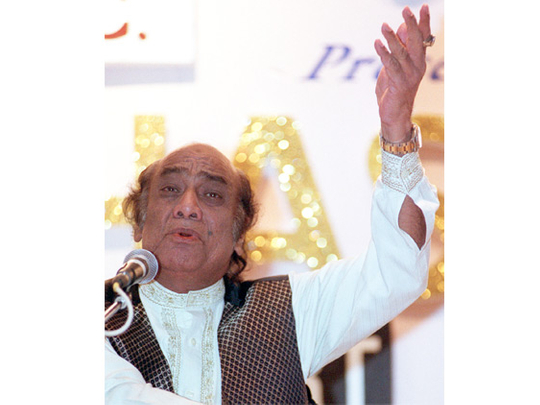
Lahore: He worked in a bicycle shop. He repaired cars. And when he would sing a ghazal, he would mesmerise a continent.
Pakistani ghazal legend Mehdi Hassan, who suffered from lung, chest and urinary tract ailments for ten years, died of breathing complications at a Karachi hospital on Wednesday at the age of 84.
His famous ghazals (ballads) include “Patta patta boota boota,” “Abke bicchde khwaabon mein mile”, “Zindagi mein sabhi pyar kiya kartein hain,” “Dekh tu dil ki jaan se uthta hai,” and “Ranjish hi Sahi”.
“My father’s funeral will take place Friday in Karachi,” son Arif Mehdi said, adding that the family was yet to finalise the burial location. “We have asked for the permission from the government to bury him at Quaid-e-Azam mazar [near the mausoleum of Mohammad Ali Jinnah, the founding father of Pakistan] in Karachi, but we are waiting for approval,” he said.
Born into a family of musicians in Loona village in undivided India (now in the Indian state of Rajasthan) in July 1927, Hassan had a modest beginning, mirroring the situation of the new country he migrated to at age 20 after the partition of India in 1947.
The family sank into penury after moving to Pakistan, and eking out a living was difficult. Young Hassan worked in a bicycle shop and later became a car mechanic, even as he was initiated into music by father Ustad Azeem Khan and uncle Ustad Esmail Khan, who were dhrupad (Indian classical) musicians.
In his book “Mehdi Hasan: The Man & his Music”, Pakistani author Asif Noorani writes that his humility during this phase stood tall against the fame and greatness he had achieved later.
“He had earned his living by repairing automobiles during his younger days. During his years of stardom, his harmonium broke and he started repairing it himself, wittingly replying to the people surrounding him that this was a piece of cake compared to the number of engines that he had repaired in the past,” Noorani writes.
Eventually, Hassan found his real vocation in the ghazal.
Mehdi is said to have given his first performance when he was eight, in sync with tradition where musicians started early and were paced through various levels of public performance before they graduated as accomplished vocalists.
The hardships of life notwithstanding, Hassan stuck to his music and continued with his rigorous practice, relying on the extreme discipline he lent to his style of constricted-throat singing as opposed to the full-throated version.
Innovative approach
He was well into his twenties when he was first noticed as a singer of some merit. The break came when he was invited to sing for Radio Pakistan in Karachi in 1957 — first as a thumri singer and then as a ghazal exponent.
Hassan had to work harder than many of his younger colleagues but his innovative approach earned him fame.
Traditionally, ghazals were sung in a thumri-like manner. They were set to Indian classical ragas such as Khamaj, Piloo and Desh. The classical format stymied the scope of the compositions — preventing it from innovating. However, Hassan pioneered a ghazal “gayaki” (manner of singing) that played upon the mood of the music rather than on the classical nuances. A composer of rare brilliance, his style combined classical and Rajasthani folk music to create a new realm of ghazals whose magic spread beyond Pakistan to India and the rest of the world.
He was one of the first Pakistani ghazal singers who charmed Indian audiences and won impressive fan followings — former Indian prime minister Atal Bihari Vajpayee invited him for a private performance at his residence.
But many more years were to pass after 1957 for Hassan to get his opportunity to sing for films.
As Hassan arrived, the ghazal stage was dominated by greats as Khan Sahib Barkat Ali Khan, Mukhtar Begum and Begum Akhtar. Among Hassan’s contemporaries were Farida Khanum, Iqbal Bano and Ustad Amanat Ali Khan, with Gulam Ali and Jagjit Singh followed not too far behind.
According to an estimate by Arif, Hassan sang more than 20,000 songs and apart from Urdu, also sang in Bengali, Punjabi and Pashto.
It’s not uncommon for a singer whose career spanned over 50 years to churn up 20,000 songs. But given the quality and the unfailing discipline which were the hallmarks of Hassan’s songs, it will go down in the history of music as a gigantic superhuman effort. And the way Hassan sustained himself until health issues made it impossible for him to carry on, is a remarkable story that parallels the struggles of his homeland.
After shining on the musical firmament from the 1960s to 1980s, Hassan’s career started fading as frequent illnesses took their toll. The death of his first wife in 1998 followed by an attack of paralysis restricted Hassan to bed and he lost the power of speech. His health deteriorated further over the past 12 years.
His home country honoured Hassan with several awards and honours — from Tamgha-e-Imtiaz to Pride of Performance and Hilal-e-Imtiaz — while India honoured him with the Sehgal Award in 1979. The Nepal government too honoured him with the Gorkha Dakshina Bahu.
Hassan, who married twice, is survived by 14 children — nine sons and five daughters. His second wife also died before him.
His death brings the curtains down on a journey in music that lasted more than 50 years and crafted a new era of lyricism, melody and poetry in ghazals.
With inputs from IANS and Mohammad Ashraf/Correspondent












